
The scaly-naped amazon, also known as the scaly-naped parrot, mercenary amazon, Tschudi's amazon, mountain parrot, or gray-naped amazon is a species of parrot in the family Psittacidae. It is found along the Andes in the northern part of South America. Its natural habitats are subtropical or tropical moist lowland forest and subtropical or tropical moist montane forest.

The Hispaniolan amazon or Hispaniolan parrot, colloquially known as cuca, is a species of Amazon parrot in the family Psittacidae. It is endemic to Hispaniola, and has been introduced to Puerto Rico. The main features that differentiate it from other amazons are the white forehead, pale beak, white eye-ring, blue ear patch, and red belly.

The black-billed scythebill is a species of bird in the subfamily Dendrocolaptinae. It is found in eastern Brazil, eastern Paraguay and far northeastern Argentina.
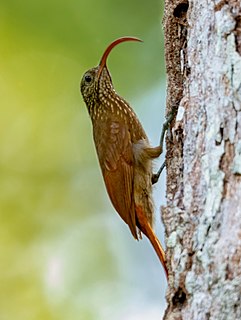
The curve-billed scythebill is a species of bird in the ovenbird family. It is found in Amazonia. Its natural habitat is subtropical or tropical moist lowland forests.
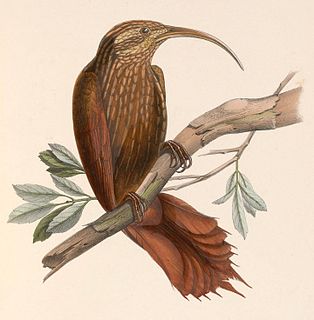
The greater scythebill is a species of bird in the Dendrocolaptinae subfamily. This species is found at very low densities in highland rainforests and cloud forests in the Tropical Andes in Colombia, Ecuador, and Peru. It has traditionally been included in the genus Campylorhamphus together with the other scythebills, but the discovery of its closer affinities with the scimitar-billed woodcreeper resulted in the description of the new genus Drymotoxeres for the Greater Scythebill.

The brown-billed scythebill is a species of bird in the family Furnariidae.
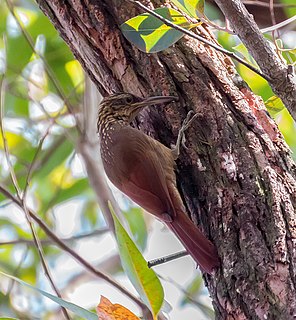
The black-banded woodcreeper is a species of bird in the Dendrocolaptinae subfamily, the woodcreepers. It is discontinuously spread from Chiapas to Paraguay and northern Argentina. Its natural habitats are subtropical or tropical moist lowland forests and subtropical or tropical moist montane forests.

The whiskered flowerpecker is a species of bird in the family Dicaeidae. It is endemic to the island of Mindanao in the Philippines.
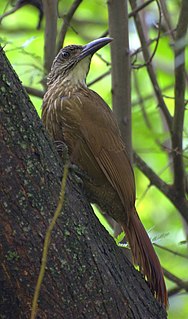
The white-throated woodcreeper is a species of bird in the Dendrocolaptinae subfamily. It is found in Argentina, Brazil, and Paraguay.
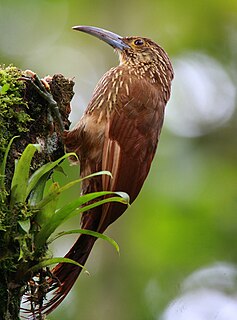
The strong-billed woodcreeper is a species of bird in the Dendrocolaptinae subfamily. It is one of the largest woodcreepers and the largest furnariids, though the slender long-billed woodcreeper is longer and the great rufous woodcreeper is larger overall. There is some size variation across the range, with typical birds measuring 28–31 cm (11-12.5 in) long and weighing about 120 grams (4.2 oz). Large strong-billed woodcreepers can measure up to 35 cm (14 in) and weigh 169 grams (6 oz). The most distinctive feature of this typically marked striped, brownish bird is its massive, semi-decurved bill, which may be brown or blackish.
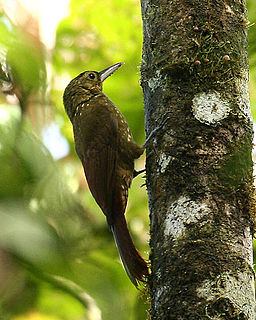
The spotted woodcreeper is a species of bird in the Dendrocolaptinae subfamily. It is found in Belize, Colombia, Costa Rica, Ecuador, El Salvador, Guatemala, Honduras, Mexico, Nicaragua, and Panama.

The ivory-billed woodcreeper is a species of bird of the order of Passerformes, which are perching birds. It is in the family Furnariidae (ovenbirds) and the subfamily Dendrocolaptinae (woodcreepers).

The lesser woodcreeper is a species of bird in the woodcreeper subfamily (Dendrocolaptinae). It is found in eastern Brazil. Its natural habitats are subtropical or tropical moist lowland forest and subtropical or tropical moist montane forest.

The ocellated woodcreeper is a species of bird in the Dendrocolaptinae subfamily of the ovenbird family (Furnariidae). It sometimes includes the Tschudi's woodcreeper as a subspecies.

The chestnut-rumped woodcreeper is a species of perching bird. Like the other woodcreepers, it belongs to the subfamily Dendrocolaptinae of the ovenbird family (Furnariidae).

The straight-billed woodcreeper is a species of bird in the woodcreeper subfamily (Dendrocolaptinae). Its genus, Dendroplex, was recently confirmed to be distinct from Xiphorhynchus. It is found in Bolivia, Brazil, Colombia, Ecuador, French Guiana, Guyana, Panama, Peru, Suriname, Trinidad and Tobago, and Venezuela. Its natural habitats are subtropical or tropical dry forests, subtropical or tropical moist lowland forests, subtropical or tropical mangrove forests, and heavily degraded former forest.

The spotted ground thrush is a species of bird in the family Turdidae. It is found in the Democratic Republic of the Congo, Kenya, Malawi, South Africa, Sudan, Tanzania, and possibly Mozambique.

The Philippine trogon is a species of bird in the family Trogonidae. It is endemic to the Philippines.

The cinnamon-rumped trogon is a species of bird in the family Trogonidae.
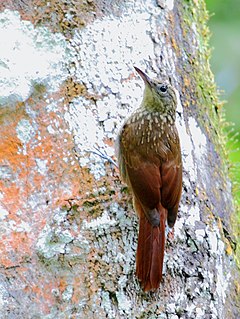
The Ceara woodcreeper or Atlantic woodcreeper is a species of bird in the woodcreeper subfamily (Dendrocolaptinae). It is found in northeastern Brazil. Its natural habitats are subtropical or tropical moist lowland forest and subtropical or tropical moist montane forest.























